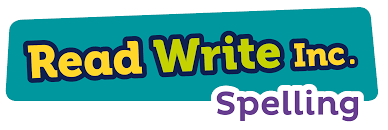Spelling
Spelling Curriculum
 The Read Write Inc. Spelling programme provides structured, systematic teaching and this is why we have chosen this scheme in our approach to the discrete teaching of spelling.
The Read Write Inc. Spelling programme provides structured, systematic teaching and this is why we have chosen this scheme in our approach to the discrete teaching of spelling.
The RWI Spelling programme allows children at Townfield to:
- Meet the spelling expectations of the National Curriculum 2014
- Spell new words correctly and have plenty of practice in spelling them, including exception words and homophones.
- Spell words as accurately as possible using their phonic knowledge and other knowledge of spelling, such as morphology [the study of the form of words] and etymology [the study of the origins and the development of words].
- Understand and apply the concepts of word structure
- Spell words that they have not yet been taught by using what they have learnt about how spelling works in English.

RWI Spelling is an interactive programme, which teaches spellings in a fun and engaging way. Each unit is introduced with a short video. It helps children to learn spellings with common patterns and uses rules in order to help them recall spellings, as well as teaching exceptions to these rules.
Children in Reception and Year 1 will take part in a daily spelling session as part of their daily RWI lesson. They will learn to spell decodable words (green words) using ‘Fred fingers’, as well as the spellings of the required common exception words (red words) for their year group.
As children progress into Years 2 to Year 6, they will have daily 15 minute spelling sessions. These are important in helping them to practise the spellings they need to learn from each unit. Each unit explains the rules, and gives handy tips and rhymes for remembering these.
As part of the programme, Red and Orange words are referred to and taught discretely. Red words are the common exception words for Y1 and Y2 as listed in the National Curriculum in England, plus some high frequency words with unusual spellings. Orange words include all the words on the National Curriculum word lists for Years 3 and 4 and Years 5 and 6.
Statutory Spelling Lists:
Each year group has a list of statutory words they must know how to read and spell before the end of the respective year group. You can find links below to these spelling lists and can also download a copy if you wish.
Helping Your Child with Spellings at Home
1. Encourage your child to ‘have a go’
Encourage your child to have a go at spelling a word. This will build confidence and practise spelling skills. Making mistakes is a natural part of learning, and if your child is comfortable knowing that they’re not going to get spellings right all the time, then they will be more likely to try out more adventurous words. Keep positive and upbeat.
2. Keep reinforcing phonics
Remind your child to use phonics as their first port of call for spelling a new word – even in Key Stage 2. Help them to really hear each individual sound in the word and choose a suitable spelling pattern.
3. Check your spelling
Remind children to read through their writing and check for spelling errors. They need to develop a feel for whether a word looks right. Help them to check words in a dictionary.
4. Encourage your child to read
When we read, we see words spelt correctly. The more we read, the more words we see.
5. Weekly Spelling homework
• Your child will receive five spellings each week to learn at home.
• These will be reinforced in class and quizzed every Friday.
• New spellings will be sent home each Friday.
• Please encourage your child to practise both their spellings and handwriting.
